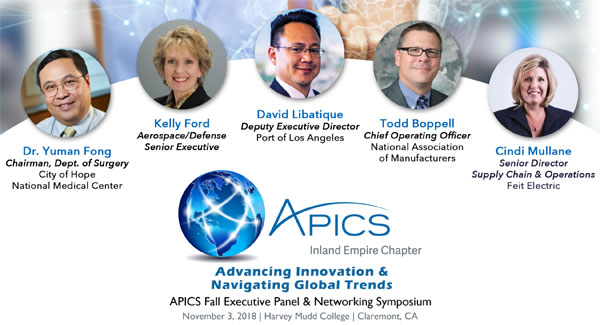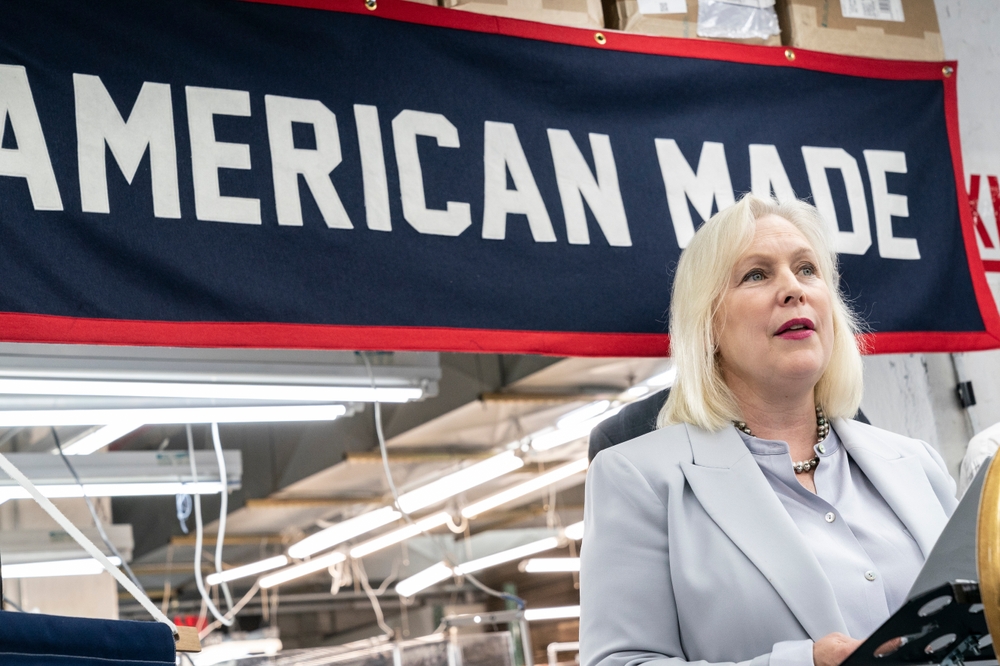Manufacturing
APICS Inland Empire Fall Symposium Features Global Innovation Experts

- Cindi Mullane – Senior Director, Supply Chain and Operations, Feit Electric
- Todd Boppell – Chief Operating Officer, National Association of Manufacturers
- David Libatique – Deputy Executive Director, Port of Los Angeles
- Kelly Ford – Aerospace/Defense Senior Executive
- Dr. Yuman Fong, Chairman, Department of Surgery, City of Hope National Media Center
About APICS – Inland Empire

Business
Alibaba.com Partners with Inland Empire Regional Chamber of Commerce to Launch California Pavilion

In a landmark initiative, Alibaba.com, a global leader in e-commerce, has announced a strategic partnership with the Inland Empire Regional Chamber of Commerce (IERCC) to bolster business opportunities for Small and Medium-sized Enterprises (SMEs) in California. This historic collaboration is set to unveil the California Pavilion on Alibaba.com, a pioneering platform promoting the “Made in California” brand to a global audience.
Join us for a special event where Mattia Miglio, Director of North America Business Development at Alibaba.com, will introduce the California Pavilion alongside representatives from the IERCC. This digital hub is the first of its kind, designed to connect California’s SMEs with international buyers, importers, and distributors, marking a significant milestone in global business expansion.
This initiative sees the convergence of several key trade associations including the California Trade Alliance, California Hispanic Chamber of Commerce, and Valley Industry & Commerce Association, all coming together to transform the SME landscape in California.
As part of the California Pavilion, members will receive an exclusive membership package offering numerous benefits designed to elevate businesses to new heights. This initiative not only supports business growth but also aligns with Alibaba’s vision of empowering SMEs in the global market.
The Inland Empire Regional Chamber of Commerce stands as a pivotal partner in this venture. Known for its innovative approaches and customized support for businesses, the IERCC plays a crucial role in guiding enterprises in the Inland Empire, from startups to established companies.
“We are thrilled to partner with Alibaba.com in this groundbreaking initiative. The California Pavilion is more than just a digital platform; it’s a beacon of opportunity for small and medium-sized enterprises across California. This collaboration is a testament to our commitment to empowering local businesses, giving them the tools and exposure they need to thrive in the global marketplace. We believe that through this partnership, we can elevate the ‘Made in California’ brand to new heights and open doors for unprecedented growth and success for our members”, stated Edward Ornelas, Jr., President & CEO of the IE Chamber.
We invite businesses to explore the advantages of joining the California Pavilion. Learn how this platform can revolutionize your business prospects and connect you with the global market.
Manufacturing
Pandemic Has Exposed ‘Clear Opportunities’ for High-Tech Manufacturing in CA

Surprise! California Is Still The Largest Contributor To The U.S. Manufacturing Industry; Productivity Growth In The State Industry Eclipses Performance In The Nation
Despite California’s famously high cost of living, the state remains the largest contributor to the U.S. manufacturing industry in terms of both employment and output. A comprehensive new analysis examines the manufacturing industry in California and reveals some surprising findings that contradict the popular perception that the industry and its workers have been priced out of the state.
The report, produced by Beacon Economics LLC and commissioned by California Manufacturing Technology Consulting (CMTC), found that the state’s manufacturing output has exceeded the national rate by 83% since the late 1990s. And contrary to widespread belief, California’s share of manufacturing jobs in the United States has ticked up slightly since 2000, currently standing at 11%.
While the study indeed points to high housing and other costs as a serious problem in attracting and retaining workers, it also shines a light on remarkable productivity gains that the state’s manufacturing sector has achieved. Notably, these output gains, as well as lesser gains in manufacturing employment, have been primarily driven by the state’s high-technology subsectors while lower-technology, lower-paying subsectors have declined.
“It’s a well-understood trend that traditional manufacturing jobs in sectors such as apparel and food processing have diminished over the past several decades in California due to the state’s exceptionally high land and living costs,” said Taner Osman, Research Manager at Beacon Economics and the report’s lead author. “But the headlines we read miss the striking advances that have occurred in output as a result of innovations, improvements, and investments in production processes – particularly in high tech.”
Additionally, the analysis highlights the fact that the trend of fewer jobs, but higher output, is also reflected at the national level. In the United States as a whole, manufacturing employment has fallen by 32% since 1990, while nominal output has increased by almost 40%, according to the report. Nationally, this dichotomy is being driven by increases in labor productivity, particularly in durable goods manufacturing.
Key Findings
- In the United States today, each hour of manufacturing labor produces twice the value of output it did in 1990.
- California is still the largest contributor to the U.S. manufacturing industry – both in terms of employment and output. As stated earlier, the productivity growth in the state’s manufacturing sector has eclipsed the performance of the industry nationally by more than 80% since the 1990s.
- The value of production in the U.S. manufacturing industry has more than doubled in nominal terms since 1990, reaching nearly $4.5 trillion in 2019. In 2020, manufacturing accounted for 11.7% of U.S. GDP.
- The long-term decline in manufacturing employment is evident: Approximately 5.7 million manufacturing jobs were lost between 1990 and 2020 in the United States, reducing employment in the industry by nearly one-third.
- California is the largest state contributor to national manufacturing GDP, representing 14.5%, followed by Texas at 10.9%. Further behind are Ohio, Illinois, Indiana, North Carolina, Pennsylvania, and Michigan.
- The manufacturing industry’s ‘value added’ in California has grown three-times the national rate, increasing almost 176% since 1997, compared to 51% in the nation overall.
- There are currently 53,000 job openings in California’s manufacturing sector. If the state is unable to address its housing affordability crisis, parts of the industry will continue to leave.
- Of California’s 21 manufacturing subsectors, 11 gained jobs and 10 lost jobs between 2010 and 2020. The most jobs were added in transportation equipment manufacturing. The largest job losses occurred in apparel manufacturing.
- California is competitive in high-technology industries such as semiconductors, computers, peripherals electronic components, communications equipment, and sophisticated radar and satellite instrumentation. Despite losing employment long term, the state is also competitive in lower-technology industries, such as beverages, machinery, and food processing due to productivity advancements.
- The pandemic has exposed the fragility of global supply chains and created clear opportunities and incentives to bring production closer to home. There is now the very real prospect of firms regionalizing supply networks, given the vulnerabilities that exist in different parts of the supply chain.
- California’s key competitive advantage will be to develop and retain workers with cutting-edge skills. The state’s manufacturers require a workforce with the specialized skillsets needed for working with more advanced technologies. Maintaining such a workforce will lead to an increase in productivity and competitiveness. State policy should target and support the types of training that workers need to retain their competitive edge.
For more information, download CMTC’s free California manufacturing infographic.
Manufacturing
Despite COVID’s Upheaval, California Manufacturing Technology Consulting’s (CMTC) Clients Continued to Boost Revenues, Cost Savings

CALIFORNIA MANUFACTURING IMPACT FACT SHEET
In the face of a disruptive and unprecedented year of health mandated shutdowns across the manufacturing industry, California Manufacturing Technology Consulting® (CMTC), the Manufacturing Extension Partnership (MEP) Center in California, continued to help firms in the state grow their revenues, retain jobs, and increase cost savings. Amid industry losses on a macroeconomic scale due to the COVID-19 pandemic, CMTC remarkably still supplied hundreds of California manufacturing businesses with services that boosted their annual performance in 2020, according to a newly released economic impact analysis.
The report, produced by Beacon Economics and commissioned by CMTC, found that impacts stemming directly from their MEP-related work included over $159 million in increased sales and over $441 million in retained sales in 2020. The program also directly resulted in the creation of 1,777 manufacturing jobs in the state and the retention of more than 6,000 jobs.
“Manufacturing plays a vital role in California’s larger economy which makes these results and CMTC’s overall function so welcome and so critical,” said Mazen Bou Zeineddine, a Research Manager at Beacon Economics and the report’s lead author. “The success CMTC had in supporting the state’s manufacturing businesses during an immensely challenging year is a true testament to the MEP program’s ingenuity and long-term effectiveness.”
Given the workforce challenges, ever-evolving technological advances and changes in capital investment, CMTC has enabled small and medium-sized manufacturers to successfully cope with the changing manufacturing landscape, according to Bou Zeineddine.
Other key impacts stemming from the California MEP in 2020 includes a significant contribution to the California economy with client impacts generating $5.9B in total economic output. CMTC’s client impacts not only supported manufacturing jobs but the multiplier effect created or retained another 11,665 non-manufacturing jobs.
“Given all that manufacturing was faced with in 2020, CMTC was able to find ways to assist manufacturers during an extreme time of need,” said Bou Zeineddine.
For more information and findings from the report, download CMTC’s California manufacturing impact fact sheet.
-

 Opinion1 month ago
Opinion1 month agoSurge in Unemployment Among California Youth Linked to Minimum Wage Hikes
-

 Commercial Real Estate Transactions3 weeks ago
Commercial Real Estate Transactions3 weeks agoSRS Real Estate Partners Announces Record-Breaking $6.15 Million Ground Lease Sale of a New Construction Chick-fil-A Property in Murrieta, California
-

 Health & Wellness3 weeks ago
Health & Wellness3 weeks agoBuddha Bars: A Mother’s Innovative Solution to Healthy Snacking
-
By Press Release1 week ago
California Employment Expansion Continues But Still Trails Nation



